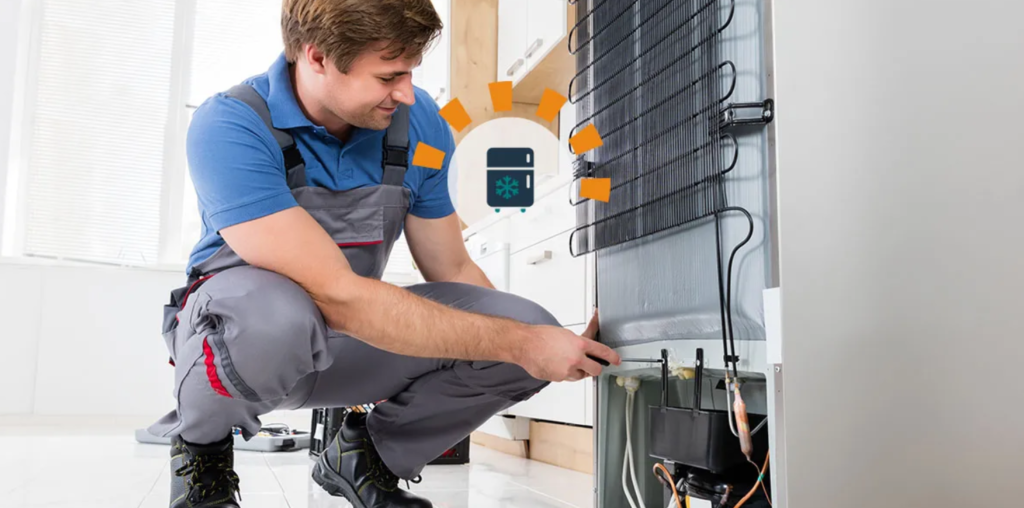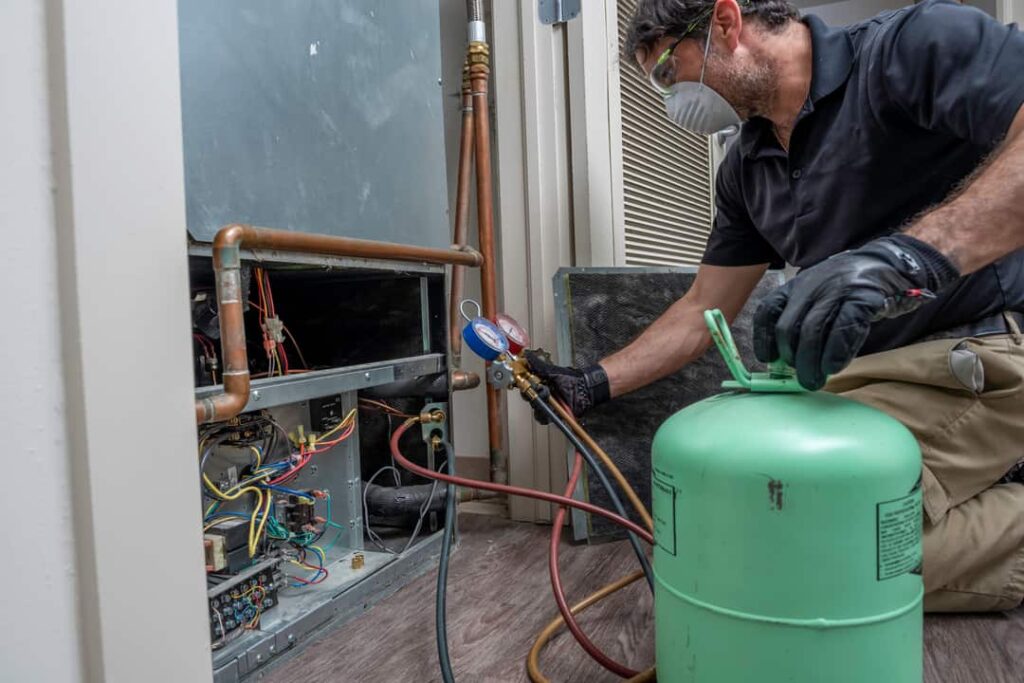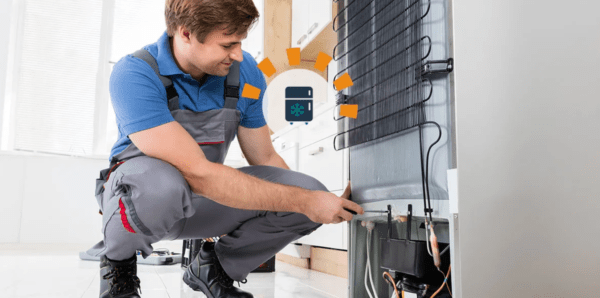
Credit: dumpsters.com
Introduction
Are you a homeowner with an old refrigerator or air conditioner that needs service? Maybe you’re wondering how to properly dispose of these appliances while ensuring the responsible removal of refrigerants like Freon. Proper freon disposal is crucial for the protection of our environment and the prevention of ozone layer depletion. Freon, a common refrigerant used in appliances such as refrigerators and air conditioners, needs to be handled and disposed of safely and responsibly. In this blog post, we’ll explore the importance of Freon removal, the process of disposing of refrigerators or air conditioners, and the steps you can take to ensure proper waste disposal. We will also discuss important warnings and precautions to be aware of when dealing with Freon and its disposal. Finally, we will provide tips for individuals and businesses to ensure they handle and dispose of Freon appropriately, in compliance with legal regulations governing refrigerant disposal.
What Freon is?

Credit: homelybaron.com
When it comes to refrigerators and air conditioners, the refrigerant used is typically Freon, also known as chlorofluorocarbon (CFC). Freon is a class of chemicals that can cause harm to the environment, specifically the stratospheric ozone layer. This layer plays a critical role in protecting us from harmful UV radiation. When CFCs, like Freon, are released into the atmosphere, they can deplete the ozone layer and contribute to global warming.
How are refrigerants disposed of?
Refrigerants, including Freon, are typically disposed of by certified technicians or professionals who specialize in appliance disposal. These technicians have the necessary skills and knowledge to safely handle and remove refrigerants from appliances, ensuring that they are properly disposed of or recycled. It is important to note that refrigerants should never be disposed of in regular household waste or poured down the drain, as they can be harmful to the environment and human health.
How do you safely remove Freon?
The process of safely removing Freon from appliances involves following specific guidelines and procedures. To remove Freon, a certified technician will first ensure that the appliance is turned off and disconnected from power. They will then use specialized equipment to vent and evacuate the refrigerant from the system into a recovery cylinder. This process requires expertise to avoid any leaks or accidental release of the refrigerant into the atmosphere. It is crucial to hire a certified professional to handle the removal of Freon to ensure it is done safely and effectively.
How is Freon recycled?
Freon, like other refrigerants, can be recycled to reduce its impact on the environment. The recycling process involves purifying and reusing the refrigerant instead of disposing of it. Certified recyclers use advanced techniques to remove impurities and contaminants from the recovered Freon, making it suitable for reuse in other appliances. Recycling Freon not only reduces the demand for new refrigerants but also prevents the release of ozone-depleting substances (ODS) into the atmosphere.
What happens to old Freon?
Once the Freon has been safely removed from appliances, it is typically collected by certified technicians or recycling companies. The collected Freon is then sent to specialized facilities equipped for the proper handling and recycling of refrigerants. At these facilities, the Freon undergoes a thorough purification process to remove any impurities and contaminants. Once purified, the recycled Freon can be used in new appliances, reducing the need for the production of new refrigerants and minimizing environmental impact.
To prevent the release of Freon into the environment, it is crucial to have it removed by a certified professional. The Environmental Protection Agency (EPA) requires that Freon must be removed from all refrigeration and air conditioning units by a Section 608 certified technician. They will safely remove the Freon from your appliance and ensure that it is disposed of by municipal waste handling regulations.
It’s worth noting that some waste haulers may charge a fee for this service, but in many cases, you may be eligible for a rebate or incentive for properly disposing of your old appliance. When contacting a waste hauler or recycler, be sure to provide them with the serial number of your appliance. Once the Freon has been removed and the appliance is in good working order, you have a few options. Materials such as plastic, metal, and glass can be recycled, reducing the amount of waste that ends up in landfills. Proper Freon removal is essential to protect the stratospheric ozone layer and reduce environmental harm.
Are there any warnings or precautions to be aware of when dealing with Freon and its disposal?
Dealing with Freon and its disposal requires utmost caution due to its potential harm to the environment and human health. Freon contains chlorine atoms, which can deplete the ozone layer and contribute to ozone depletion. Exposure to Freon can have adverse effects on human health, including skin irritations, respiratory issues, and even death in extreme cases. Therefore, it is essential to handle and dispose of Freon in a responsible and environmentally friendly manner.
When it comes to household appliances, the freezer is undoubtedly a rad invention. It helps us keep our food fresh and extends its shelf life by utilizing the gas-phase cooling technique. However, over time, your freezer or refrigerator may require maintenance or disposal, especially when it comes to the removal of freon. Freon, also known as HCFCs (hydrochlorofluorocarbons), is commonly used as a refrigerant in air conditioning and refrigeration units. However, due to its ozone depletion potential and harmful effects on the stratosphere, it has been phased out of use in recent years. But what should you do if you need to remove freon from a refrigerator?
Firstly, it’s important to note that attempting to remove freon without the proper knowledge and equipment can be dangerous and even illegal. One option is to contact a licensed HVAC (heating, ventilation, and air conditioning) technician or a specialized disposer who can reclaim the freon from your appliance.
It is worth mentioning that “Freon” is a trademarked name for a specific type of refrigerant, so it’s essential to clarify which refrigerant your appliance uses. Nowadays, most refrigerants used are ozone-friendly and have a lower impact on the environment. These newer refrigerants do not contain chlorine, making them less harmful to the ozone layer. Then, they will access the compressor, which is the heart of the cooling system, and recover the freon using specialized equipment. By disposing of your old refrigerator correctly, you not only prevent harmful substances from entering the waste stream but also contribute to the conservation of natural resources.
Can you share some tips for individuals or businesses to ensure they handle and dispose of Freon appropriately?
To ensure proper handling and disposal of Freon, individuals and businesses should consider the following tips:
- Hire a certified technician: When removing Freon from appliances, always hire a certified technician who is trained in the proper procedures for refrigerant removal and disposal. Certified technicians have the expertise to handle Freon safely and follow the necessary regulations.
- Inquire about disposal options: Before disposing of an appliance containing Freon, contact your local municipality or public works department to inquire about proper disposal methods. They can guide the appropriate disposal facilities or waste haulers in your area.
- Recycle old appliances: Instead of disposing of appliances containing Freon, consider recycling them. Many retailers offer recycling programs for old household appliances, including refrigerators and air conditioners. Recycling ensures that the Freon is safely removed and the appliance is properly disposed of or recycled.
- Check for leaks: Regularly inspect your appliances for any signs of Freon leaks. If you detect a leak, contact a certified technician immediately to prevent the release of Freon into the environment.
Legal regulations governing the disposal of Freon
The disposal of Freon is governed by legal regulations to protect the environment and human health. The Environmental Protection Agency (EPA) in the United States has specific guidelines and requirements for the proper disposal of refrigerants. These regulations, outlined in Section 608 of the Clean Air Act, mandate that refrigerants must be removed from appliances by certified technicians and disposed of or recycled according to EPA-approved methods. It is crucial to abide by these regulations to ensure the responsible disposal of Freon and prevent harm to the environment.
The need for proper Freon disposal
Proper disposal of Freon is essential to prevent ozone layer depletion and protect the environment.
The EPA’s RAD program encourages responsible disposal practices for appliances that contain refrigerants, like refrigerators and AC units. This program promotes the safe removal of refrigerants before dismantling the appliances, ensuring their proper disposal or recycling.
Only these certified personnel are legally allowed to remove Freon and then dispose of it. They pass exams given by the Environmental Protection Agency to do this. Never try to vent refrigerant yourself, as it damages human health and the environment. Plus, doing so is illegal.
Whether you need to dispose of an old refrigerator or are looking to purchase a new one, knowing how to handle refrigerants like HFCs responsibly can make a significant difference in reducing your carbon footprint. HFCs, or Hydrofluorocarbons, are commonly used as refrigerants in various cooling systems.
Conclusion

Credit: stansac.com
Gas-phase air conditioning units have become an integral part of our lives, providing us with cool air during hot summer days. However, there comes a time when these units need to be replaced due to wear and tear or inefficiency. When it’s time to replace your gas-phase AC unit, it is essential to prioritize the proper disposal of the old unit. By doing so, you contribute to the protection of the environment and comply with EPA regulations. Opting for professional disposal services, utilizing retailer or manufacturer programs, contacting local recycling centers, or participating in the EPA’s RAD program are all reliable ways to ensure the safe removal of refrigerants and the environmentally responsible disposal of gas phase AC units. Let’s all do our part in creating a sustainable future.

